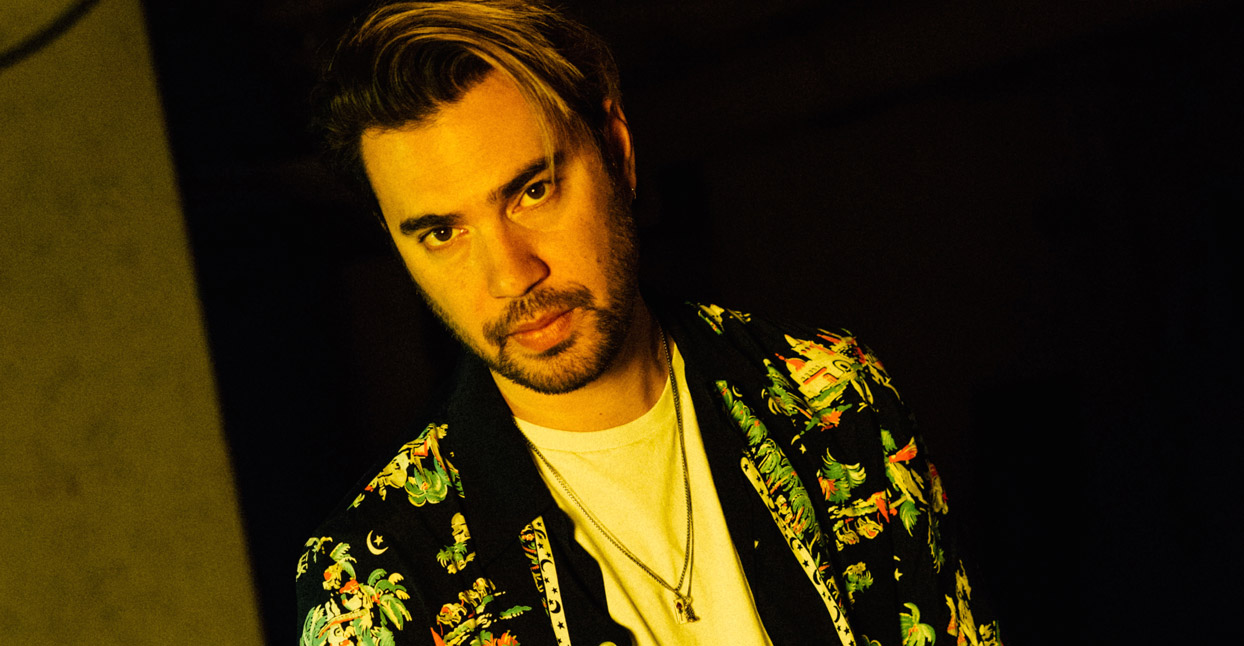
Although he’s already four records deep into a successful career, Hanni El Khatib was looking forward to taking a break after he wrapped an extensive tour. But it wasn’t long before he found himself in the studio, banging out material in a series of low-stakes sessions that would end up on a series of EPs he released over the course of 2016. Now, those five EPs have been collected into full-length, Savage Times, released this past February on Innovative Leisure, the label he co-owns.
The album’s 17 tracks showcase El Khatib at his most diverse, each song pushing his signature take on rock and roll in a different direction. The album moves from the uptempo swagger of “Paralyzed” to the stark, hymn-like “Miracle,” to the rebellious “Mondo and His Makeup,” referencing a range of musical eras and movements along the way. Lyrically, El Khatib reflects on his experiences as a first generation American (“Born Brown”), considers his own bad habits (“Hold Me Back”) and embraces individuality (“Freak Freely”)
The child of immigrant parents from Palestine and the Philippines, El Khatib grew up in San Francisco, and has called Los Angeles home for nearly a decade (though he’s often away, perpetually on tour across the States and abroad, most frequently, in France). We met up with El Khatib during a one-week break in his touring schedule to talk about the challenge of self-reflection, how the immediacy of releasing songs as he finished them enabled him to be more honest, the value of personal freedom, and why the cycle of culture dictates that rappers are the new rock stars.
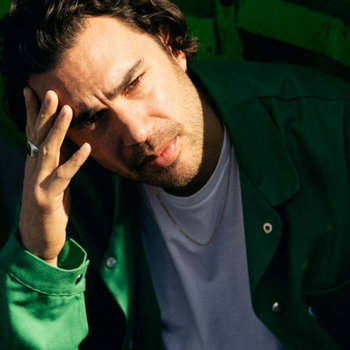
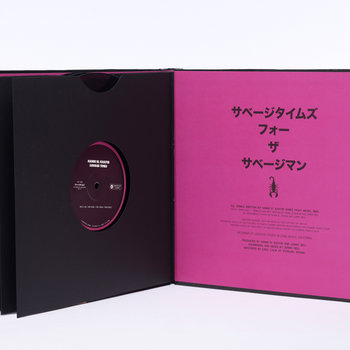
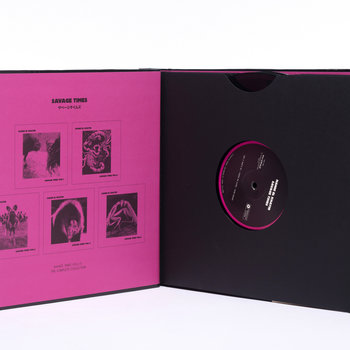
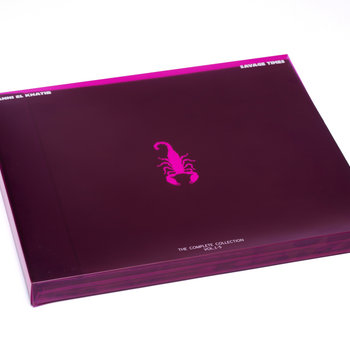
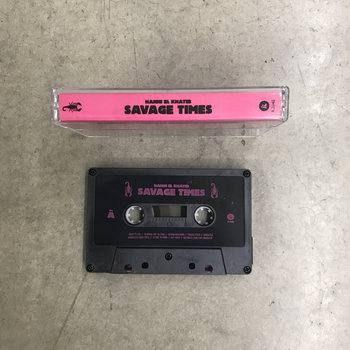
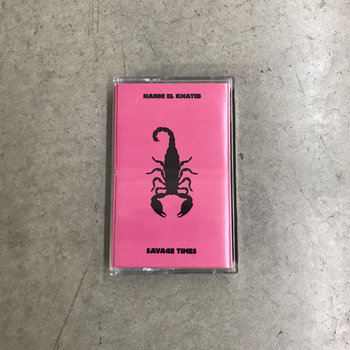

Vinyl LP, Compact Disc (CD), Cassette




You just did a pop-up shop in Paris in collaboration with Huf. What else are you doing?
I did a special kind-of collaboration with them for my album. We are doing a traveling pop-up store. It started in Paris last week for fashion week at Sonos House, and then it’s moving to Tokyo and it’s going to exist in the actual Huff store in Harajuku. And then we’re doing some supporting events, so there’s going to be two additional events and parties, and then there’s going to be two live shows as part of it.
It was interesting because the shop wasn’t in a retail space. Originally we were going to put it in a retail space, but the space that we had in mind kind of fell through and last minute we were kind of debating what to do. Some things that I thought would be easy to do were, logistically, a nightmare. We made footwear—it’s a whole thing.
I saw there were jacks and jeans.
There’s a denim range, there’s footwear, there’s T-shirts, hats and then the vinyl aspect and then a bit of accessories. So it’s literally a whole collection. But the logistics of it, and for it to exist for only three days in Paris when it’s coming from all different corners of the world, it’s a little difficult. So our original plan kind of fell through and then we got offered a better plan, but it’s more niche. For the fans that actually did make it out there, they enjoyed it, because when they arrived there, they were like ‘Oh, this isn’t some shopping experience. It’s a house and people are giving me a drink and I’m going from room to room to room and there’s different music playing.’ On some occasions, I was actually there hanging out with them, shooting shit, talking about music. If this was in a regular storefront environment, it’d be much different. It’d just be based on commerce instead of an experience.
The Tokyo version of it, while we are going to have the store element to it. I think the additional thing that we’re trying to add as an interactive piece of it are the events that we’re throwing along with it: two live shows, a couple DJ party nights—things like that that are a little more inclusive rather than just ‘Hey, here’s my pop-up, come here and buy my shit.’
What was your intention in staging it? A new experience for yourself? A new way of merch?
It’s a new way to communicate an album launch, in a sense. It’s just another facet I kind of wanted to touch on. In the past, I’ve done other projects, but I’ve kept it all separate. Music goes with music, my design stays with design, skateboarding stays with skateboarding, art direction is art direction. And now, surrounding this record and over the past couple years, I’ve sort of been fusing it all together. I think this was my way of showing the rest of the world, ‘Okay, well, in my early days, I was creative director for Huff for six years, and then I quit for five to do music and then came back to help out and do it again because I kind of missed it.’
The thing is that it’s just an extension of what I’ve always done. To me, it’s kind of playing with that idea, like ‘Oh, I can do that, and I won’t just print my logo on a bunch of sweatshirts.’ It’s like a challenge and an exercise. Basically, carry out a concept through a completely different format.
Other than things like this, what are some other things that challenge you?
Daily life. It’s like, the older you get, the more you’re confronted with the reality of how you’ve been living, or how you’ve been perceiving life or whatever. And I just sort of realized I’ve been existing in my own space for so long—maybe selfishly—so I’m kind of at a point now where I’m becoming more introspective and critical of how I act on a regular basis. That seems to be more challenging than anything. I guess self-improvement is more challenging than putting out a record. When I was younger, being creative was challenging. Now, being creative isn’t quite challenging. I find ways to challenge myself creatively, but what’s more challenging is to maintain being a good person—the normal shit. Not getting pissed off in traffic—that’s more challenging than trying to [do creative work].
Were you’re already examining means of self-improvement before you went into this record? Or was it as you were recording the EPs that you started really looking at yourself?
I think working it out publicly in a sense, in this format, happened as I started recording. I’ve always tried to work on myself, but I’ve never tried to marry the two together. I usually kept a lot of personal stuff out of my music. I was always fond of story-teller singer-songwriters, like Dylan, Lou Reed, Nick Cave, Tom Waits. Those kind of people who always interested me lyrically. In the past, I would sneak in subtle things that relate to me personally. Whereas on this record, my intent was to do the opposite: just go straight there with no—I don’t know, no…
…Barriers?
Yeah, no sugarcoated glossiness. I stripped away any sort of form of poetics. Some of the lyrics are about as straightforward as you can get. That was the intent: ‘Okay, well, if I strip away all the fluff and just say the idea matter-of-fact, it might take on new meaning.’ It felt cathartic as I was doing that. ‘Born Brown,’ that was a song that I didn’t even [consciously] write. I knew the phrase ‘born brown’ was going to be there, and I just went in and hit record and started screaming. That’s the first thing that kind of ‘fell out’—how it sounds is the way it played out when I recorded it. On my last record, or the record before, I would be sitting there writing, trying to figure out a way to talk about self-identity. I probably would have thought about it. And the goal of these songs are just to be guttural, be instinctual, be spontaneous. And that’s truthfully why I released it in this fashion [as a series of EPs], because every artist second guesses themselves. And I didn’t really allow myself time to sit on it, like, ‘Oh, maybe I shouldn’t say that, or maybe I shouldn’t release it because, oh fuck, there’s a mistake there.’ It was like, ‘No, I already sent it out to mastering. It’s being released.’ So that was another exercise for me, to practice the art of not being too precious or critical of yourself and just to do it.





Vinyl LP, Compact Disc (CD), Cassette




With ‘Born Brown,’ that song sounds like an anthem, and I think that a lot of people would shy away from being so blunt. A lot of times, as people of color, you might have people who could misconstrue what you’re saying. But ‘Born Brown’ is just out there. It’s so straightforward, take it or leave it. So I’m wondering how people are responding to it?
It’s been very positive. A lot of American immigrants that I’ve spoken with, after the song had been released, have received it in a positive way. I feel like it’s being received as an anthem for people of color in America—which was not necessarily my intent.
What was your intent?
It was really a self-proclamation of my identity, I guess. Just really feeling like I’ve always been mistaken for something I’m not. I couldn’t tell you how many times I’ve been asked if I was Spanish, Mexican. I’ve been told I was white—all these things. And not that that bothers me, but I’m 35, so over the course of 35 years, being told that you’re something that you’re not, sometimes you just want to shout at people and be like, ‘Dude I’m actually…’ Because I’m always like, ‘Oh, well, I’m actually Filipino and Palestinian.’ And then the response typically is like, ‘Whoa what?’ That’s usually the response. Sometimes it’s followed with, ‘That’s weird. I thought you were Italian.’ And there’s definitely nothing wrong with that, but what I’m saying is, when you’re younger and you hear this, it really starts to kind…
Wear on your psyche?
Yeah. It wears on your psyche. Kind of like, ‘What am I supposed to be?’ And then to top it off, I don’t speak Tagalog or Arabic.
Really? Your parents didn’t teach you?
No, my parents raised me speaking English. I was born in San Francisco, I’ve never been back to their countries. So this a thing that adds even more confusion to my own self-identity. So I just felt like screaming this, and that’s what I left it at. A song like ‘Mangos and Rice’ is very similar, except I’m just talking about the food I grew up on, but it’s the same idea. It’s just that one song has a bit more jarring approach
I enjoyed that, too, because it made me think of ‘Sunshowers’ by M.I.A., which has the lyric ‘I salt and pepper my mangos’—and it’s mangos and rice, so unabashedly Southeast Asian.
She has always been great about being straightforward and not hiding behind too much poetry and abstract thought.
I really liked ‘Born Brown’ because my dad’s from Jamaica and moved here in like ’78. And so being multiracial, people were always like, ‘What are you?’
Do you know that show Hate Thy Neighbor?
No.
It’s on Viceland right now. The guy, Jamali Maddix, he gets mixed up, too, by people. He has a big beard and is half black and people think he’s Muslim, but he’s not. For us, it’s so normal for people to get it confused. And then we just start to be like, ‘Yeah, whatever.’ You are just so desensitized to it that you don’t even care. But then when I sit back and think, I’m like, ‘Fuck, I don’t even really know what I am.’ I just feel like I’m American, I guess, but I don’t know what I’m supposed to feel.





Vinyl LP, Compact Disc (CD), Cassette




For years you’ve been going over to France, and you’ve been there quite frequently. Why is that?
It’s just at a certain level there, and people understand it and relate to it in a different way. My guess is that my exposure there is a little different than here. I also think that rock n’ roll music in general is still relevant in France. For America and other parts of the world—I mean, rap and R&B is what’s really going on in America. And EDM. And so when the biggest rock bands in the world aren’t really even that big compared to some of these superstars, it doesn’t give me much faith for rock n’ roll music in 2017.
But music is a cycle, and pop music is a cycle. At one point, rock n’ roll was the biggest thing in the world, and blues music was out and R&B was nonexistent. It all just goes and goes and goes, and you just can’t really stop or think about it.
I just did a TV show in France where we did a 40-minute set, plus interviews. That wouldn’t happen for me in America. I wouldn’t play a 40-minute set. They just appreciate that genre of music a bit more still. People fucking love to argue with me about it—‘No that’s not true. What about these bands that are on the radio?’ I’m like, ‘That’s fine, but I’m talking about culturally moving the needle of pop culture, and being relevant to youth culture.’ It’s not rock music, I hate to break it to you. Little Yachty and Lil Uzi [Vert] have more cultural relevance than probably some of the biggest stars in rock and roll.
I’m not saying that a rock band can’t fill the Staples Center—I know they can. But does every kid who has Instagram and Twitter, are those kids checking for rock music? No.
And I have a record label that has, like, 15 rock artists on it. I make rock music. You think I wouldn’t love to see it be at the forefront? But I’m telling you from firsthand experience that it’s not. Somebody asked me, ‘What is it to be rock in 2017?’ And I was like, ‘Be a rapper.’
But rock music is still your chosen genre. What is it that you still love about it?
There’s a certain level of excitement to the live aspect of it. And that’s really thrilling. There’s something very exciting about seeing live music being played by a group of musicians, and there’s something that I connect to on a personal level where when I see a show that excites me. An amazing bedroom producer that makes beats and stuff, they may be awesome, but then when I see a show, I might need some production to make me feel it. I might need to see a visual show. I might need to have the lights be a certain way. If you put me in a room with a guy and a laptop and I’m moving around, I don’t know that I’m going to get that emotional takeaway that I want from the music. I’d rather just listen to it on my own time with my headphones and just trip out that way. But with instrument-based music, live instrumentation, you can get that almost immediately. And if they’re good, it’s really good.
I’ve spoken to a lot of rappers, and the more musical rappers, the rappers that really care about where the music is coming from as opposed to how the beat’s knocking, those guys have all told me that their favorite way to perform music is when they’re rapping with a live band. It’s why Kendrick Lamar has a full live band on stage. He’s connected to the music. He’s a rapper, yes, but he’s more musical than most musicians in the world, you know? It’s no surprise that when I see him perform at a festival, he’s got a fucking six-piece band up there.
How much do you feel you exist in the live realm, as opposed to on record? Because on record, the energy comes across. But if somebody is going to ‘get’ you, how important is it for them to see you in the live setting?
I always felt you needed to see me to get the record. And then, as I’ve made records, I think this last record, I would feel comfortable with people understanding what I’m all about [just listening to the record.] This record I think unlocked a lot of things that I wasn’t capable of doing prior because of just timing and where I was at, musically. The musicianship and the production [on this record] isn’t quite as slick or stellar compared to the second or third record or whatever, but the energy that I try to put out in live shows is there. I was physically exhausted after recording these songs. I’d never experienced that. That’s new. And I thought, ‘Okay, that means I’ve tapped into something new. I’ve tapped into a way to channel what we do live, and to channel it on record.’ And I’m paying for it now, because I’m realizing it’s difficult to perform these songs physically.
I lost my voice twice in France, and I had to get a doctor to come before in the TV show to give me a shot so my voice came back. It was really fucked up, but really hilarious, because I lost my voice in sound check. I talked to my publicist and the woman who handles artist relations at the TV station, and I said, ‘What do you do when a big rock star, pop musician loses their voice before your show?’ And they just looked at me like I was crazy. They were just like, ‘Do you want a doctor? I have the one who’s on call. He just came in last for Beyoncé and Rihanna when they were doing this thing. They both lost their voice.’ I was like, ‘This is a thing?’ That request sounded like something I’d read in a Rolling Stones’ biography, you know what I mean?
We were just laughing about it—’I guess rock docs are real!’ And the dude came in, just shot me up with some shit, and I started singing an hour later.





Vinyl LP, Compact Disc (CD), Cassette




Rihanna, Beyoncé—you’re essentially at rock star status in France. Is it weird to go from performing on TV and getting a rock doctor, to being much more ‘indie’ here in the U.S.?
It used to be a little confusing that I couldn’t level that out. But the more I look at the career path that I’ve chosen, I have many opportunities to go different ways. I chose to stay indie. I chose to own everything that I do. It’s just more important for me to have control over my own destiny. I just prefer to know that I’m allowed to do what I want, when I want. It’s why I get involved in other stuff, because I’m constantly in fear that the rug will be pulled out, and I won’t be able to rely on music for money. It’s a healthy fear, because it motivates me to continue to act on every impulse that I have creatively.
With you having that constant fear, that anxiety—what’s it like to be living in L.A. with that? Because the cost of living is so high here.
The cost of living was, like, double in S.F.
Yes. And with gentrification, things are just going up. And that’s for every city. It’s weird. Do you think you’re going to stay in LA, or are you just here until it doesn’t feel right?
I debate this all the time, because I don’t really know that I fit in here. I don’t know how much I really feel like I belong to this city. I can’t tell if it’s me getting a little bit older, but I just really want to be isolated—to live alone in a place that’s super peaceful and disconnected, so that I can create stuff. And I often think, ‘Is it even feasible? Could I rent another house, or buy a house in Joshua Tree or something?’ I don’t know. I can’t tell. Because I’m like, ‘A city is a city is a city, and I’m always traveling anyway, so maybe it doesn’t matter that I move. Maybe it’s fine.’ But then the more I think about it, the more I’m like, ‘Fuck, I need to be more disconnected.’ I want to be even more disconnected than now. Everyone tells me that knows me, they’re like, ‘No, you’ll go crazy for sure. You’re too wound up. You have too many things going on.’ I just wonder, can I afford it? [Pauses.] I probably can’t.
—Nilina Mason-Campbell







